#understand and remember
Explore tagged Tumblr posts
Text
What is Pain? : How Austin Eubanks Dealt with Addiction and the Aftermath of Columbine.
Austin and Corey
Stephen Austin Eubanks was a junior and a star student in Columbine High School. Corey Tyler DePooter, his best friend, was also a particularly gifted student who prioritized his studies over anything else. Despite having a wide range of interests, the two kids particularly bonded over their shared passion for fishing.
At the age of 17, Corey had gotten a job doing maintenance at a golf club in order to earn money for a fishing boat that he planned to buy with a friend — likely Austin. The two often used to go fishing together and would talk about the struggles they had as teenagers.
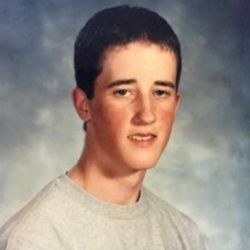
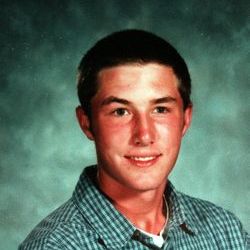
Day of the Tragedy
On April 20th of 1999, the two were inside the library getting ready to get lunch with their friends, Jennifer Doyle and Peter Ball. That was until they had heard shots fired from the outside, not recognizing the sounds and believing that it was only the sounds of construction. Then they heard a bomb go off, a teacher rushing in to scream for the students to hide underneath the table because two students were armed with guns.
In a state of shock and fear, the four duck under the same table near the windows. With 10 minutes passing, the shooters had already entered the library and methodically fired under each table as recalled by him. His best friend, Corey, was one of those who were shot after being aimed with a semi-automatic rifle and shot at the neck, chest, and left arm by Dylan Klebold.
The bullet that hit Austin's hand first passed through his best friend, killing him instantly. With his best friend lying lifelessly beside him and being wounded on his hand and knee, Austin had no other choice than to try to play dead while laying in a pool of blood. When the shooting had stopped, Austin ran through the smoke and out of the backdoor of the library. He was only 17 when the shooting occured.
In Austin's TedTalk “What Columbine Shooting taught me about pain and addiction”, he recalls:
"I remember how I felt: I was confused, I was afraid, I felt sick and I was vulnerable. And just minutes later, I was playing dead underneath a table next to a pool of blood. I had just been shot and I witnessed my best friend murdered right in front of me as we were huddled together waiting for help to come."
Pain, Grief, and Narcotics
During the time he fled from the crime scene, Austin marked that as one of the most impacting and damaging experiences he has ever experienced in regards to the feeling of pain. His definition of pain was nothing similar to what he describes in his present days.
Pain, in a medical sense, is the variably unpleasant sensation of physiological systems mediated by specific nerve fibers of the brain that are conscious of receiving signals of awareness. According to Austin's TedTalk, the American Pain Society introduced the term "pain is the fifth vital sign" in 1996. This means that when you enter the room, your status is assessed using five different data points: blood pressure, pulse rate, temperature, respiration rate, and pain.
Due to a movement that was certain that we were undertreating pain, patient satisfaction surveys were implemented in order to monitor the campaign's success. To him, in order to uphold this new momentum and cause the patient's pain levels to cease completely, the ethical dilemma instantly arose:
“Do I issue this person with narcotics to make them happy or deny them and potentially hurt my compensation, the revenue of the hospital? Or at worse, open myself up for a grievance for undertreating pain that could potentially result in the loss of my job?”
Austin says that the healthcare system predominantly treats physiological systems and would rather not assess emotional pain into the equation. He akins the emotional pain of dealing with trauma being identical or if not more than when dealing with physical pain. With that, within months after the incident, Austin was prescribed opiate medication for his injuries.
In an exclusive interview with The Fix, he said that his injuries were not to the point of needing an opiate pain medication but was immediately given a 30-day supply and became addicted within three months. From then on, he said, “I used substances every day, day in and day out.”
After the shooting, his parents took him to a therapist who said Austin was too shut down to process his horrific trauma. But the reason no one could reach him was because he was overmedicated. He was addicted to painkillers, and used medication because of his unwillingness to engage in the stages of grief that he dreaded to face. He was haunted by the past. Struggling with survivor's guilt and the death of his best friend, he would rather ignore the intense burdening feelings he bore. According to him,
“Acute Physical Pain ends relatively quickly, complex emotional pain does not.”
The morphine Eubanks received at the hospital that day proved to be the opening dose of a costly addiction to prescription painkillers - one that revolved around commonly prescribed drug Oxycontin, he said.
“I learned to manipulate doctors … I could literally get whatever I wanted. Telling them I’d been shot at Columbine and lost my best friend was like [getting] an open prescription book from any doctor.”
He could not process the grief, moreso, he didn't want to. He didn't want to be haunted by the memories that scarred him. In his own words, he would describe the physical ailments he felt to be a 4 or 5, but the emotional turmoil was a 10.
Austin never set foot back to Columbine. His parents hired a tutor and he then went on to graduate in 2000. He attended the Columbine ceremonies but never went back inside the school. He then went into advertising and married in his early 20s. Around this time his substance abuse escalated, and his first attempt to get sober was in 2006. He went into a 30-day inpatient program but failed within hours of leaving, for relapsing using pain pills and Adderall.
Addiction and Sobriety
He failed both outpatient and rehab twice and it wasn't until 10 years later, in 2009 that he was able to overcome this addiction. Right before Columbine, young Austin had been misdiagnosed with ADD.
“I didn’t have ADD,” said Eubanks. “I just liked being outdoors and playing golf better than being in school. At that time, if anybody was truant at school they said, ‘Oh, they must be ADD. Let’s put them on a stimulant.’ That was why I got Adderall. I liked it because I could abuse opiate pain medication to the level that most people would be nodding out. With Adderall, I could function. Basically, I was doing oral speedballs. It was like using methamphetamine and heroin.”
His second try at being sober was in 2008. Gaining the motivation to change after recently separating from his wife, he went to treatment, stayed 90 days, and achieved eight months of sobriety. Then, he akinned addiction to a causal sequence, a domino effect. According to him, he achieved abstinence for a period of time, built up enough false confidence to where he thought he could drink, because alcohol was never a problem. From alcohol, he went to weed, then Xanax, then Oxycontin, and then back into the same routine.
In 2011, approaching the age of 30 and estranged from his wife and kids, he hit rock bottom: "My sobriety date is April 2, 2011. I woke up in a jail cell and had no clue how I got there." His downward spiral began with Oxycontin and alcohol abuse, leading to arrests for various offenses like car theft and fraud. Realizing that he needed a drastic change, he recounted that his lowest moment was waking up in withdrawal, hungover, and facing the ruins of his marriage and being estranged from his children. He knew he had to stop or he would die. After unsuccessful attempts at sobriety, he finally sought help, surrendered to treatment, and was now willing to follow any guidance to rebuild his life.
His journey to lasting sobriety didn't hinge on traditional 12-step programs, but rather on understanding behavioral triggers and brain function through a therapeutic community approach. He was five years sober and started working at The Foundry in Colorado, becoming the COO and handling approaches that combined neuroscience with 12-step principles, recognizing that each person's path to recovery is unique. Using comprehensive approaches aiming to rebuild the lives of those in recovery.
During this time, he would also indulge in old activities in remembrance of his bestfriend.
“It’s something I do to connect with Corey. It's always nice whenever I catch a fish that's above the normal or something special about it. I always tend to look up and give a nod to him. And I know he’s still looking out for me."
Sadly, despite his long battle against drug addiction, in 2019, Austin had passed away in his home in Colorado after an accidental heroin overdose. Just a month after the 20th anniversary of Columbine, Austin was 37 at the time.
What is Pain?
Pain, to Austin, encompassed many things: the confusion and vulnerability of not knowing what to do in such a time of terror, the physical wounds that the doctors tried to medicate to bring the pain meter to zero, and most importantly, the emotional hurt of knowing your best friend was gone, taken right in front of you. Knowing that very moment can never be undone.
His advice for survivors dealing with the same guilt is to feel it. Don't run away from it. Survivors often find other things that allow them to detach from the pain, but to him, that's the wrong choice.
“You can heal physical pain while you’re medicating it. You cannot heal emotional pain while you are medicating it, In order to heal emotional pain, you have to feel it ... You want to feel better immediately, [but] you have to have the courage to sit in and feel it, and if you can do that long enough, you will come out on the other side.”
Along with post-traumatic stress, there is also the potential for post-traumatic growth.
“That doesn’t imply you will ever be the same person again. After a trauma, you will be changed forever.”
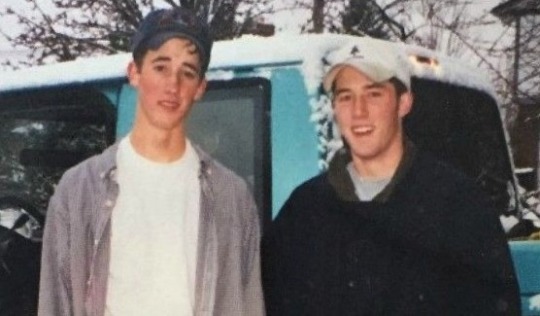
153 notes
·
View notes
Text
Security Units have morning routines too.
#alexander skarsgard#murderbot#murderbot tv#now i understand why it's so annoyed all the time#2000 notes later i remember to add source#fml
7K notes
·
View notes
Text
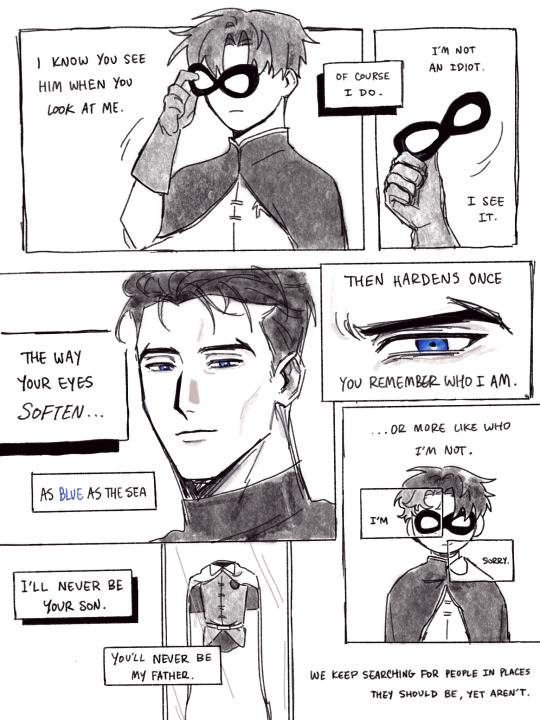
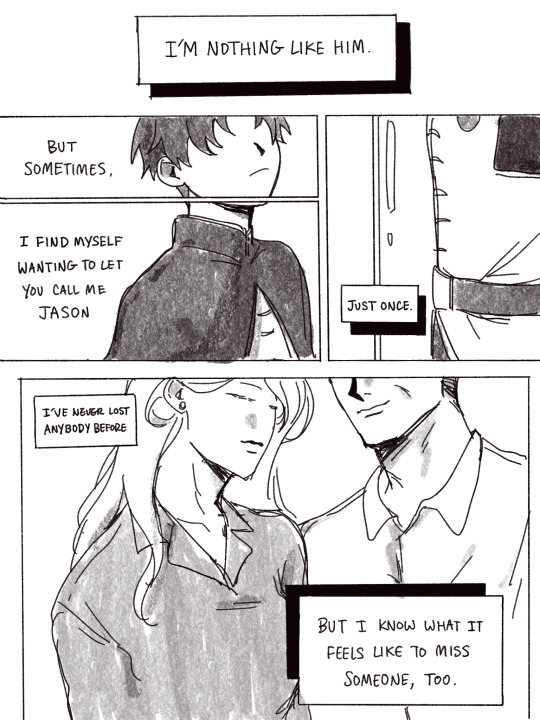
i’ll let you, just once.
edit: okay i might be silly. totally forgot that janet does die before tim officially become robin. my brain got it mixed up its been too long. the message still works but aaaaah would have been more impactful if i had remembered!
however. let’s just say this is foreshadowing and mama drake hasn’t died yet but will very, very soon. that’s why she’s centred instead of jack. tim will soon learn a similar pain to bruce
#tim drake#bruce wayne#batman#robin#janet drake#jack drake#a sort of continuation of the first comic#they are both so sad always#sigh#tim knows he is not jason and will never be jason for bruce#he doesn’t want to either#he actually wants bruce to remember that he isn’t jason#but he also understands how he feels#please get therapy you two#i have too many thoughts i can’t write them all down but i promise they’re really profound#dc#dc comics#dc fanart#my art
6K notes
·
View notes
Text
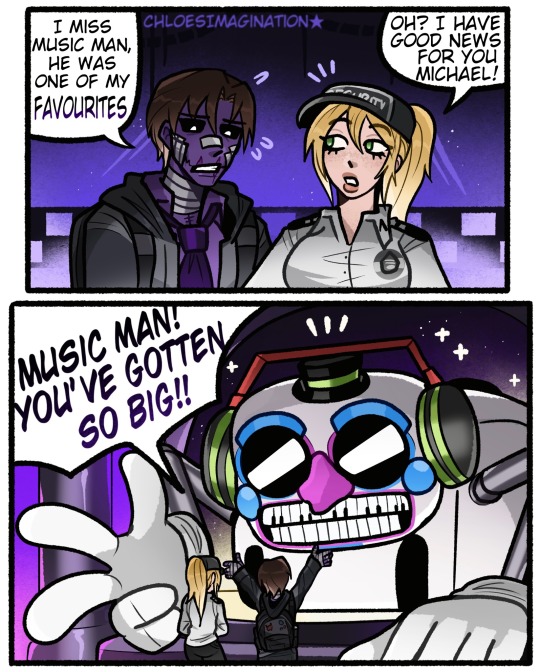
Everyone loves FNAF music man.. even Michael
#myart#chloesimagination#comic#fnaf#five nights at freddy's#fnaf fanart#fnaf movie#fnaf vanessa#fnaf vanny#michael afton#dj music man#security breach#fnaf pizzeria simulator#MICHEAL GETS another W in the pizzaplex!!#I love doing these comics where Vanessa shows Michael around#updates him on everything new in Freddy’s#usually it’s changes he’s not really into#BUT THIS ONE HE IS#Finally the unsung hero of MUSIC MAN is here#he got all the clout#Everyone understands what Michael liked about him now 💜#Think DJ remembers Michael too he knows#also this is so wild but first time seeing Michael’s bag dead on PFF#bag reveal ✨
11K notes
·
View notes
Text

– Noor Unnahar, Instagram account "noor_unnahar"
[TEXT ID: / [Lemons] / My father's mother loved lemons. Years after her passing, / we run out of everything, but never / lemons. / Nothing else shelters grief / better than memory. / It's my father way of saying, / even in your absence, you will be / cared by me. / END ID]
#reminds me of my mom who now watch english movies even though english is not her first language and struggles to understands too but she do#all this because of my brother who loved to watch different movies while growing up but now move to another countryy#so she remembers him while watching that#now we all should cry together#light academia#dark academia#excerpts#fragments#poetry#words#literature#noor unnahar#spilled poem#short peoms#grief poem#grief#on grief#spilled thoughts#peots on tumblr#spilled ink
20K notes
·
View notes
Text

how i feel about all the changes in s3
#listen i understand complaints and feeling disappointed but y’all gotta remember there’s always the og campaign#there were questionable choices definetly but being negative about it on the internet just does disservice to all the good stuff#it ain’t perfect i miss the group kill but i’m honestly blaming steaming’s whole ‘every season must be the same length’ model#like this season really could’ve used an extra 3 episodes but alas! they made it as solid as possible for tv in that time!#tlovm#critical role#the legend of vox machina#tlovm season 3#also kiki resurrecting percy near and dear to my heart but also the vax percy bond and getting to see more of percy’s torment mmmm#also the cr cast are clearly having fun with it so its not like some foreign entity is committing sacrilege when they change stuff!
7K notes
·
View notes
Text
Been haunted by a kids interactive exhibit my sister and I went to some 25 years ago. I could remember blurry bits and pieces, even was able to find the museum that housed it. But thanks to reddit I was finally able to find proof that it existed and the name of it and I feel so free now.
#also crazy how much i accurately remembered given i was like... just starting to form memories#but it stuck with me because i think it was the first time I experienced the feeling of uncanny valley#i remember understanding that there wasnt anything inherently scary but i was so uneasy as i was curious#that seems to be the consensus from other people too#some were terrified to the point of running out#this was supposed to be a fun kids experience btw not scary#i want to be insane and contact the museum to be like hey what was that all about#the exhibit closed for good in 2017 after 18 years#im pretty sure i went when it was brand new in 99
2K notes
·
View notes
Text

he’s nervous
#just a little guy#is he this small fr? well.. who’s to say…#drawing him ultra mega small is like crack to me#I understand those Robin artists who make dick look 4 years old like I’m right there with you now 😭😭😭😭😭😭#minnow ☹️#tadpole ☹️#my art#arthur curry#garth of shayeris#aquaman#aqualad#dc#dc comics#it’s been so long I don’t even remember my tags#I can’t believe he’s scared of fish WAAAAAAAAHHHH
3K notes
·
View notes
Text
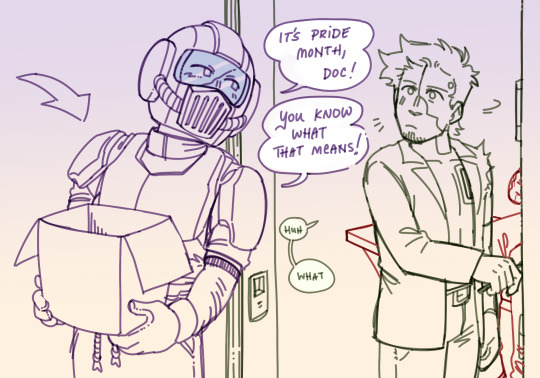
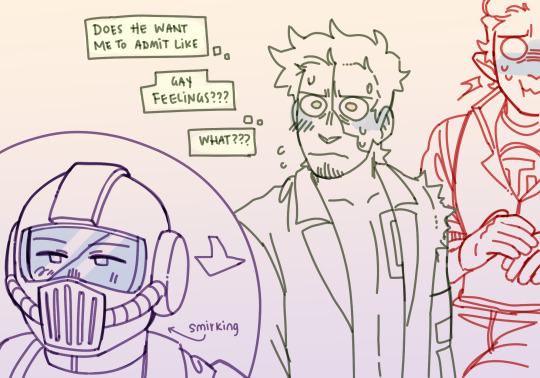
oh how the turn tables <3
[X] [X]
#whether or not Xisuma knows exactly what he's doing#or if he just thinks he's clever for repeating back the same thing doc said to him a year ago despite not understanding the joke#is a complete enigma#dbhc s10#the world will never know#tango better keep his stupid mouth shut :)#doc will obliterate him#<3#art escapades#HAPPY PRIDE MONTH#xisuma gets his revenge <3 or something#dbhc#dbhc art#dbhc sillies#dbhc doc#dbhc xisuma#dbhc docsuma#?????#i dont remember if i tagged it as that last year#hermitshipping#just in case
2K notes
·
View notes
Text
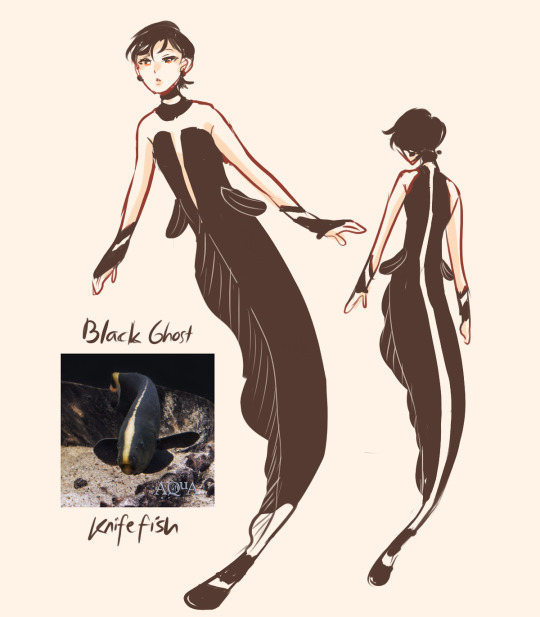
yuu as my favorite freshwater fish

#it's a freshwater fish so it won't be on fl0yd's radar; wait betta fish is freshwater fish#how cool it is if yuu is called black ghost knifefish#honestly i don't understand how this shape is good to survive in the wild; the one and only fish that be like that#it always looks like feather u use for writing to me#black ghost knifefish#twst#twisted wonderland#twst yuu#twst mc#fanart#i used to make my father kept a few#but then they grew bigger than the tank capacity#one of the big one jumped out overnight :'^(#i don't remember what happened with the others....#i wish one day i could independently keep one
1K notes
·
View notes
Note
What are some facts or tidbits about Daniel that you don't think is very well-known?
Hey! Thanks for the great question. I have a few things not a lot of people have talked about Daniel, all of which are information taken from his father's book: "Walking in Daniel's Shoes".
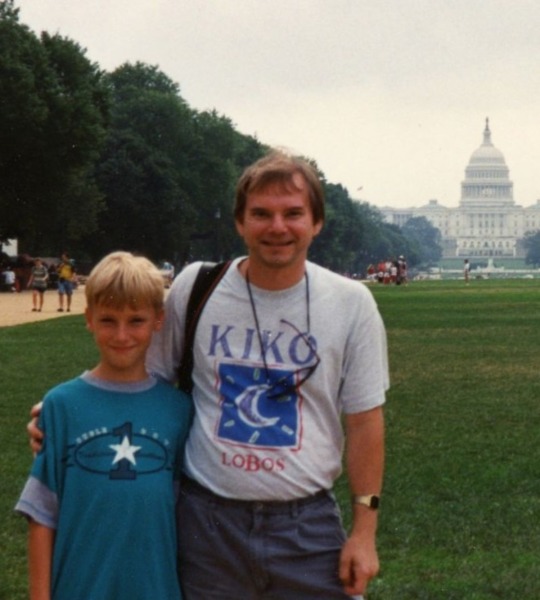


Facts about Daniel Mauser
1. Daniel's name came from the Biblical character Daniel and his mother Linda's fondness of Elton John's song titled with the same name. Conner was Linda's maiden name and since she was an only child, it was a way for them to carry her family's last name.
2. In sixth grade, he struggled somewhat with depression. After his mother sent him to a therapist, it was revealed that he was feeling stressed because at the time, he had pneumonia and missed school a few times. He felt that his teacher was pressuring him to catch up. Fortunately, he recovered after a few months.
3. Daniel used to be in cub scouts and boy scouts for a few years. Once school had became more hectic and he was more engaged in piano lessons, he dropped out of the scouts. He had earned basic badges but was not too enthusiastic with scouting long-term.
4. On July 24, 1999, Boy Scout 359 installed a park bench in Daniel’s memory along the South Rim Trail at Roxborough State Park, ten miles south of Columbine. Daniel was once a member of the Boy Scout Troop that preceded 359. Roxborough was the Mauser family’s favorite hiking area.
5. He played chess and won second place in a Denver metro tournament as a member of the school's chest club team. He also won two National Science Olympiad awards, presented to the top ten scorers in general science knowledge.
6. He was an occasional babysitter and was great with kids.
7. He was a Junior Volunteer at Swedish Hospital for two summers and helped in the pharmacy and he expressed interest in working in a medical or medical research field.
8. Despite winning often in games like Super Mario Brothers and even Foosball, his dad had caught on he was getting bored of playing with him, but despite that, he still played whenever he was invited because that was how much he loved his father.
9. He had a keen interest in current events and social issues and was a frequent reader of Time Magazine and viewer of 60 Minutes.
10. His father said he sometimes worried about little things, like if the gas tank in the car was getting too low.
11. He played soccer for a couple of years when he was younger, tried skiing, and played baseball on a YMCA team.
12. Before his death, Daniel's Biology teacher told his mother that he would be receiving an award for outstanding sophomore biology student. It was a supposed secret, one which Daniel never found out.
13. His family was very close. Tom described them as a "Dinner Table Family", who always ate dinner together. According to his father's words, "there was no sneaking off to watch the TV or play on the computer. We are together, talked together, and exchanged stories."
14. Daniel and his sister were close despite their contrasting personalities. Daniel was more like his mother—shy, introspective, intelligent, and calm. His sister Christine was like her father—outgoing, witty, a bit wild and crazy. He would often roll his eyes at her and in an exasperated tone, he would exclaim, "Theater people! Oh, my God!"
15. He had a dry sense of humor and his mom thought he prided himself on being a rational sort of fellow who was not given to drama of any sort.
16. Tom, Daniel's father, grew out of poverty. He came from Finelyville, a small town south of Pittsburgh. His father was a coal miner, his mother was a housewife, and he was the youngest out of four siblings. Tom rarely had pictures of himself. However, he didn't want that to happen with his children, so he would frequently take their pictures and film them to keep memories.
17. Daniel didn't like his pictures being taken when he was a teen. His father would still insist to take pictures for keepsake.
18. When he was fifteen and a half, Daniel was qualified to receive his driver's permit but he said he wasn't ready yet.
19. His nickname in debate class, according to Devon Adams, was "Moose": "So appropriate —it's a large, amusing but quick and fierce when-it-needs-to-be animal."
20. Daniel volunteered to rake the leaves off the lawn of a neighborhood senior citizen's house after he recently had a heartattack.
79 notes
·
View notes
Text
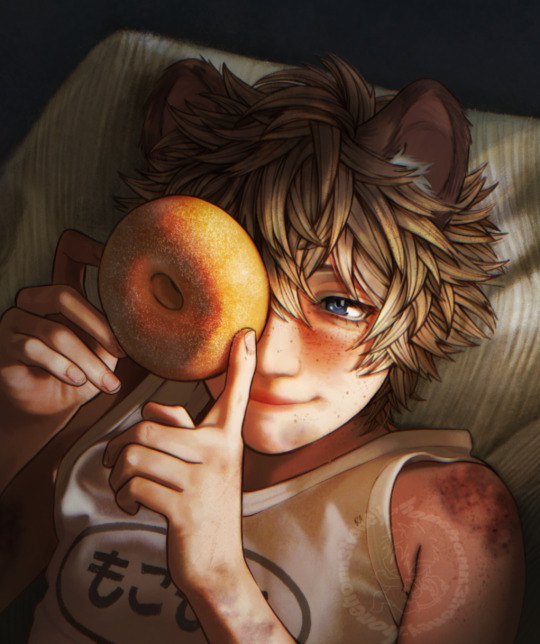
Kid Ruggie to try some new brushes
[Alt under the cut]
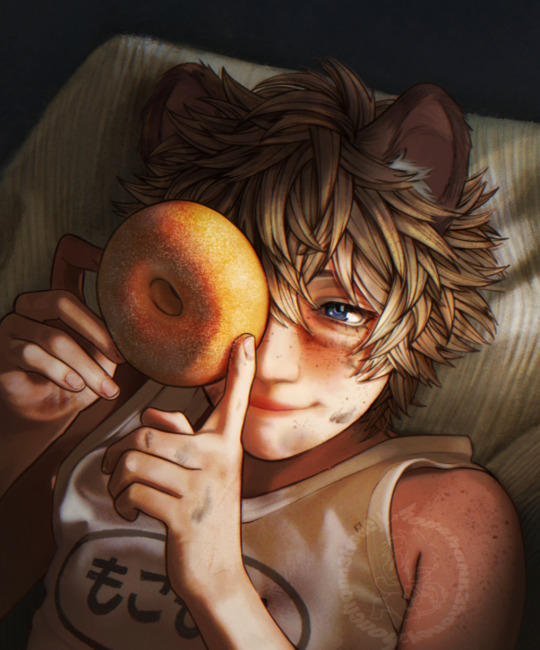
After being on the street, a little Ruggie returns home and is blessed with some homemade doughnuts/donuts :)
#The doughnut/donut remembers me a Donitas B*mbo they’re fucking expensive and so small Ruggie wouldn’t buy them#I don't understand why they're always sweaty#sometimes they taste good and others a mix that make you here my people to stop diarrhea lololol 😖#👈 My tags from 5 days ago Lol for some reason I was thinking a lot about that#Anyway. Who didn’t get bruises as a child? I was a wild boy and had bruises all the time#I don’t know Ruggie well so his essence can not be transmitted very good here#ruggie bucchi#twst ruggie#twisted wonderland ruggie#twisted wonderland#twst#twst fanart#fanart#art#honneydraws ⊹⃬۫🍜̸᩠໋࣪꣹۫
3K notes
·
View notes
Text
What the fuck is their problem

#shadow milk so happy to have his favorite and most treasured toy under his grasp#he doesnt even look mad or crazy or anything just smug#meanwhile PV looking at shmilk with pure affection#remember that PV only gains pupils when he deals with strong emotions. Just had to throw that out there#*forgets all of the psychological warfare bcuz that is quite literally the other half of his soul ans (unfortunately) he loves him*#yada yada yada#shmilk's actions are bad and wouldn't fly at all if thid was real life#but this is fiction#and it's sweet that even after everything PV still understands Shmilk and forgives him and wants to help him#and also have some weird freaky souljam sex#or smthn like that idfk what these cookies do 🤷♂️#cookie run#crk#cr kingdom#cookie run kingdom#shadowvanilla#shadow milk cookie#pure vanilla cookie#pureshadow
1K notes
·
View notes
Text
theres so much happening here
38K notes
·
View notes
Text
youtube
The animatic is done!! 💕
#look outside#look outside game#look outside spoilers#art#digital art#fanart#animation#animatic#IM SO HAPPY WITH THIS#especially the ending bits... I drew some of them up to 3 times just to make SURE I got them right#Which my lazy ass almost never bothers with#THE BITS WITH SAM UNSPOOLING ARE MY PRIDE AND JOY#I wanted to make the part where they talk to the Visitor a bit worse actually#Their body being barely held together by this creature who only vaguely understands what a human being is even supposed to look like....#and if they move to fast their body literally lags and uncoils..#I wanted to have them sharply move their head and have them look distressed when their eyes lagged a behind#but oughgh I couldnt get it to look right and I was already dying from how long I spent on it so just pretend that happened and imagine it#Other notes ermmmm. I think I got the order that the astronomers joined a little mixed up. Sorry Beryl and Aurelius.#Also while drawing the DnD scene I imagined Lyle and Masked Thing holding hands now I feel like theres something there but idk what it is#Anyway do with that what you will#Also I remembered that half the reason I gave Sam a cleft pallet was cause I wanted them to keep a recognizable feature when they mutated#so on the last frame one of the breathing holes has a notch in it bcs thats the breathing hole that used to be Sams mouth :3#Idk if thats like. wholesome to anyone else but I like it. Its some remnant left of their humanity that they'll always have#Youtube#eyestrain
1K notes
·
View notes
Text
i'm still trying to piece together the truth of it. when you left, you said: feel free to spin this narrative however you want. i have no idea if you were being cruel or if you just genuinely don't remember what you've done to me.
it's hard because i'd done so much of the work for you. i had seen the parts that flaked off, the rust underneath. i started separating you into two people - the one i loved, and the one who hurt me. i had this fantasy version of you - my partner - and then i had this stranger, a third person who would show up randomly to shatter me. i am deliriously glad i'm no longer with "the stranger". i miss the gentle (unreal?) "other" you terribly.
at first, i was so strict about my boundaries. i remember telling you to get the fuck out of my house if you were going to talk to me like that. by the end: i would justify your behavior for you, accepting even your mistreatment as "my fault" in the grand scheme. i look back on the person i was before you - smart, independent, confident - and i feel a strange sense of detachment. i don't even recognize me.
even in one of our last conversations, you said: if you want a partner that always talks warmly to you, find someone else. there was a time that a comment like that would have made me leave. and instead, somehow, i just placidly accepted that kind of thing. you were literally telling me that i wasn't allowed to have a reaction to your cruelty - and i just took it, because you'd so fully turned things around on me.
when people are faced with irrationality, a rational brain tries to make sense of it. this is the trap. they're lovely in the morning, gentle and blue-eyed and sweet. like nothing even happened, they breeze around the house and kiss you on the mouth. but at night; who is that? they snap almost randomly; flying into an impotent rage about just-about-anything. it just doesn't make sense. so the problem must be me, and my brain, and how i think.
the traumatized brain just wants peace. so maybe i'm misremembering. maybe you were just having a bad day. maybe it's actually me.
you eventually would fully turn on me and start implying that i am the bad actor in our relationship. that's what happens, right? that's literally in the playbook. you went to therapy for all of a month, told her a half-truth, co-opted therapyspeak. you figured out how to reframe your actions as "seeking peace." any time i stood my ground, i was "gaslighting." when i asked you to be more gentle, you said i was "tone policing." you said, randomly, i had emotionally manipulated you - i still have no idea what that's even specifically referring to. maybe my consistent requests for calmness and empathy?
and while i literally know better, and i'm sitting here, trained by you, thinking: wait, fuck. was i actually the person you made me out to be?
and the thing that scares me is that i literally do not know if you ever actually saw what you were doing to me. when you'd tell me how you remember arguments, you'd always summarize them in a way where you come off as gentle and easy: "i was trying to set an important boundary." what had actually happened was 15 minutes of you shouting at me i know you did something shady, just admit it already. eventually you'd say my reaction to your shouting (when i finally reacted, which usually happened around hour three) was inevitably "disappointing" and "another way i'm silencing your feelings."
how many times did i ask you - beg you - to just take accountability? looking back, i don't think i ever heard you say: you're right. the way i talked to you was wrong of me.
i am trying to tie together the two people into a full version of you in my head. yes, you made my coffee and made me laugh and spent hours on the phone with me. and yes - you would scream at me until i had to run away and hide behind something.
i wish i did have a narrative i could pull out and shape to my whim. i wish i did have some semblance of reality. instead i just stand here, strange and vibrating, wondering: what the fuck just happened?
#spilled ink#warm up#tbh more of a diary than a poem#i need to write this stuff down bc my ptsd likes to forget trauma pretty much WHILE it's happening#and any time i find myself making it ''my fault'' again i have to walk myself through the grounding steps#it's so hard to describe emotional abuse. bc it's so fucking easy to get sucked into#like. you're an empathetic person. so when ur partner comes to you after a nasty fight and is like#“i really was trying to get my feelings heard and you didn't hear me last night” you're like - okay you know what#i'll do the right thing. this is my fault. let me take accountability and try to empathize and talk things out.#with the assumption that later - it'll be ''your turn'' right. you'll be able to bring up the screaming and talk about how#you BOTH need to make a safe space for each other. that you can't listen if your partner is literally shouting at you.#since YOU reflect and grow and try to be a better partner. you assume SHE will be doing the same thing.#but it is never your turn. she will never bring up the screaming. you cannot tell if she LEGIT just doesn't feel culpable.#and when u bring it up. she says ''so i deserved you talking to me badly? <- this doesn't go well.#she says you're blaming her. she doesn't understand that arguments are ''two sides and the truth''. it's that 1 person is right and 1 isn't#so u try to talk it out. get both perspectives heard. but over time it just becomes easier to let her get her rant out and shut up about u#until one day you wake up and despite months of treating you terribly - and admitting it 3 weeks ago!!! - she's now saying...#you were always terrible . you were always the issue. she never got her feelings heard.#meanwhile you remember literally MONTHS of supporting her and listening to her and silencing yourself.#and bc she TRAINED you to accept fault ... you just say sorry. you feel insane. you feel incredibly unhinged.#meanwhile. i fully am the kind of person that will reflect. come back after a fight. apologize before you ask. say things like#“i see your side now and i was wrong about this/that/the other thing.” ...... this is EMOTIONAL MATURITY.#she literally started calling it ''mindgames'' and ''flip flopping." ........#AHHHHHHHHHHHHHH#<- girl who def was emotionally abused but also doesn't really understand that yet#anyway love u get OUT OF THERE IF YOU RELATE BYE!!!!
843 notes
·
View notes